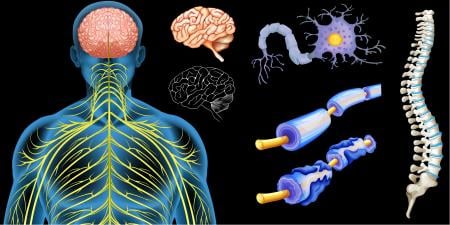Case
Ms. Moran was diagnosed with multiple sclerosis 3 years ago. She has been followed in the neurology residency clinic of a university hospital since. Soon after her diagnosis, she was started on a first-line medication for a relapsing-remitting form of multiple sclerosis (MS). Since starting the medication, she has had fewer "MS flares" (she estimates a reduction of about a third) and is satisfied with the therapy. About 2 years ago Ms. Moran began developing signs of depression and was referred to a psychiatrist.
Ms. Moran, who is 34 years old, has not had any new MS symptoms since her last visit, but comes to the clinic complaining that her depression is getting worse. She recounts that her psychiatrist has tried a "half dozen different medications and combinations" without any improvement. In fact, she feels like her mood is worse than ever. She recently lost her job as a social worker and her husband filed for divorce. Her social circle has become smaller, and she has found it increasingly difficult to leave her apartment, let alone look for a new job. She feels like she is losing hope.
Dr. Logan, the new attending physician staffing the resident clinic, is concerned that her multiple sclerosis medication may be causing or worsening Ms. Moran's depression. Dr. Logan has a background in psychiatry, having completed a combined residency in neurology and psychiatry after med school. She works almost exclusively with multiple sclerosis patients and, given her psychiatry background, has attracted a large referral base for patients with concomitant psychiatric illness. After interviewing her, Dr. Logan is confident that Ms. Moran's MS medication should be stopped.
Dr. Alderman, the resident caring for Ms. Moran, is uncomfortable with this decision. What studies there are on patients with MS and depression seem to suggest that the medication Ms. Moran is taking does not cause depression. And, given her reduction in MS flares, Dr. Alderman is reluctant to take Ms. Moran off her current medication.
Acknowledging Dr. Alderman's concern, Dr. Logan explains that in her experience the particular class of medication that Ms. Moran is taking for her multiple sclerosis does increase the occurrence of clinical depression. Dr. Alderman counters that "the evidence" says differently. Besides pointing out limitations of the studies Dr. Alderman cites, Dr. Logan explains that the particularities of this patient make it hard to apply the studies to her case. She points out Ms. Moran's family history of depression (ie, her mother suffers from depression, and her brother has attempted suicide), her current stressors, and her failure on a multitude of antidepressants. These factors, as well as others, she argues, are important in deciding on the best therapy for Ms. Moran, but they are "too particular" to get taken into account in any systematic study. "Yes," she argues, "there is evidence, but it is often too general in character to be useful for the individual patient. Ms. Moran deserves to have therapy that is tailored to her, don't you agree?"
Frustrated and a little perplexed, Dr. Alderman wonders to herself, "How do I mediate the conflict between clinical expertise and evidence-based medicine, and what do I tell Ms. Moran?"
Commentary
The resident in this clinical vignette, Dr. Alderman, simply aspires to be an evidence-based physician, a goal no doubt deeply inculcated in her during her medical education at the beginning of the 21st century. But here she is faced with an epistemic and ethical crisis, for her ideal of the evidence-based practitioner does not include deference to the views of a purported clinical expert.
Resolution of this crisis requires a thoughtful and critical review of the assumptions underlying evidence-based medicine (EBM) and clinical expertise. First, Dr. Alderman almost certainly equates the practice of EBM with the optimal practice of clinical medicine. Unfortunately, there is scant, if any, evidence to support such an assumption, and it is important to recognize that the definition of optimal practice itself cannot be derived from any empirical evidence but depends upon an understanding of the goals and values of clinical medicine. Second, Dr. Alderman must ask herself whether the care of the individual patient, in this case Ms. Moran, is really the primary goal of clinical medicine. If, as Dr. Logan suggests, providing for the well-being of the individual patient remains the ultimate duty of the physician, then a reliance on the results of clinical research for medical decision making is particularly problematic.
A gap exists between the kind of knowledge that we derive from clinical research and the kind of knowledge we need to provide optimal care to an individual. The results of empirical clinical research, usually performed in a manner that may randomize away clinically important individual characteristics, provides useful knowledge regarding populations, but application to individual cases requires clinicians to ask whether the patient-at-hand differs in an meaningful way from the "average" patient of the clinical trial. Value judgments must enter into the calculus at this level as well. At best, a clinical trial can tell us that, if we want to maximize the chances of a particular outcome, we should follow a particular course of action. But an understanding of the goals and values of an individual patient is necessary to determine whether we should be trying to achieve a particular clinical goal. Improved survival, for instance, might not be a desirable outcome if the quality of life maintained is below what is an acceptable minimum for the patient. So, while evidence derived from sound clinical research remains essential for determining the best course of action in a particular case, it is far from sufficient.
Evidence-based medicine also makes assumptions about the nature of medical knowledge that must be more closely examined. EBM expresses an explicit preference for knowledge gained from clinical research and generally regards other forms of medical knowledge, such as reasoning from pathophysiologic principles or unsystematic clinical experience, as suspect. In many hierarchies of medical evidence, pathophysiologic rationale, unsystematic clinical experience, or expert opinion rank even below data from poorly designed and conducted clinical trials. But this epistemic assumption of EBM, that clinical experience, expert opinion, and pathophysiologic reasoning differ in degree from evidence obtained from clinical research, does not withstand careful scrutiny. Rather than differing in degree, clinical experience and reasoning from pathophysiologic principles represent medical knowledge that differs in kind from empirical evidence derived from clinical research.
Clinical judgment, then, can be understood as bringing to bear all relevant kinds of medical knowledge, along with patient goals, values, and preferences, in order to reach the best possible decision for the patient-at-hand. Clinical judgment often involves weighing conflicting warrants for action and negotiating between them. Each of these kinds of medical knowledge has its own strengths and weaknesses. Despite the emphasis and entreaties of the EBM movement, however, empirical evidence derived from clinical research is neither prescriptive nor does it always trump experiential knowledge or physiologic reasoning.
Thoughtful proponents of EBM have acknowledged that evidence-based practitioners should strive to integrate the best evidence from clinical research with their clinical experience and the patient's goals and values, but they have yet to explicitly acknowledge the value of pathophysiologic reasoning and of expert opinion. Expert opinion, in particular, appears far from being rehabilitated by the EBM movement, which instead continues to vilify it as the last remnant of the "authoritarian" model of clinical practice that EBM seeks to replace. The distress of Dr. Alderman attests to this view of evidence and expertise as antithetical guides for decision making. Yet this assumption of EBM does not withstand scrutiny either. If a clinical expert develops her expertise by amassing experiential knowledge in the care of a large number of patients with a particular disorder, then expert opinion represents not the lowest form of evidence, but rather the highest form of clinical experience based on empirical evidence. Expert opinion differs only in degree from clinical experience, while both these types of experiential knowledge differ in kind from empirical evidence as derived from clinical research. If EBM recognizes the value of individual clinical experience in medical decision making, then it must acknowledge the value of incorporating expert opinion as well.
If Dr. Alderman strives to do what is best for her patient, Ms. Moran, she must incorporate all relevant medical knowledge into her clinical reasoning, as well as ascertain Ms. Moran's goals and values. Certainly the published evidence and Ms. Moran's clinical course suggest that her medication is effective with regard to her multiple sclerosis. But the lack of published reports associating the medication with depression certainly does not mean that the drug is not associated with depression, either in this case or in a larger population. Not all that is true has been demonstrated to be true; multiple contemporary examples in both the medical and lay press attest to this fact, revealing complications of medications either discovered or announced long after the medication was approved and released.
The expert opinion of Dr. Logan, developed from extensive clinical experience and with full awareness of the published literature in the area, offers a compelling reason to consider the medication a cause or factor in Ms. Moran's depression. Further examinations of the medical literature (to discover whether depression was adequately screened for in the clinical trials) and Dr. Logan's opinion (How convinced is she that depression is associated with this particular medication?) might be expected to alter the way that Dr. Alderman would weigh these 2 conflicting warrants for action in developing a treatment recommendation for Ms. Moran. But it seems almost certain that neither warrant would be prescriptive in this case. Ultimately, the goals, values, and preferences of Ms. Moran will likely be the deciding factors, for she may very well feel that her depression is currently more of an impediment to her quality of life than her multiple sclerosis and be quite amenable to a trial off the drug. As Dr. Alderman returns to the exam room, she would do well to worry less about what she will tell Ms. Moran and consider instead what she needs to learn from her.
The optimal care of the individual patient certainly requires an understanding of the relevant published evidence, but still demands the integration of other kinds of medical knowledge, both physiologic and experiential, along with the elucidation of patient goals and values, all within a complex system of health care delivery. Evidence-based medicine promises much to clinicians, but it cannot promise to make sound clinical judgment an easier task.



